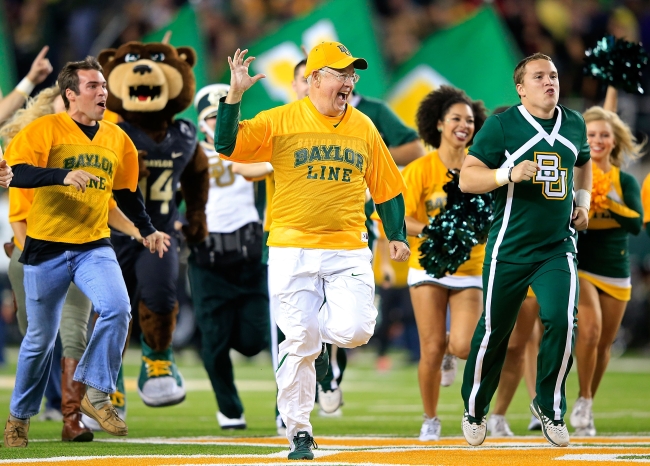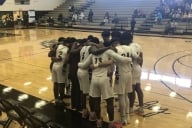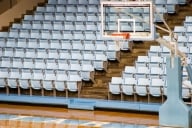You have /5 articles left.
Sign up for a free account or log in.

President Ken Starr charges the field before a Baylor football game.
Getty Images
A slew of sexual assaults by Baylor University athletes in the first half of the 2010s -- and widespread efforts by university administrators to quash information about the violence -- made the Texas private university a national example of a sports program out of control.
But when the National Collegiate Athletic Association announced the results of its years-long investigation into the Baylor scandal Wednesday, it concluded that virtually none of the university's misbehavior actually went against the association's rules.
The problem was two-fold, said the report from the Division I Committee on Infractions. The NCAA's members to date have opted not to approve national rules that make sexual assault or violence a violation, choosing to leave enforcement of sexual misbehavior largely to individual institutions. Second, the major way colleges get in hot water with the NCAA is when they treat athletes significantly differently than they do their other students, or give them "impermissible benefits." But Baylor had such a "campus-wide culture of non-reporting" sexual violence, the NCAA panel said, that athletes couldn't really be singled out as having gotten special treatment.
"Baylor admitted to moral and ethical failings in its handling of sexual violence on campus but argued that those failings, however egregious, did not constitute violations of NCAA legislation," the NCAA report said. "Ultimately, and with tremendous reluctance, this panel agrees."
"We determined that this failure was not limited to the athletics department," Joel Maturi, chief hearing officer for the panel, said during an NCAA press conference. "Faculty and staff throughout campus did not know or understand their obligation to report allegations of sexual and interpersonal violence. As a result, we reluctantly concluded that the failure to report and address incidents of sexual violence was not a violation of bylaw 16."
The NCAA placed the university on four years' probation, imposed a $5,000 fine for violations, and limited recruiting in football over what happened under former football coach Art Biles. The NCAA did find rules violations against Baylor between 2011 and 2016, including "impermissible benefits" and flawed drug testing in the football program, and violations involving Baylor's predominantly female student host program
The outcome of the Baylor case comes as the NCAA is preparing to rethink how it governs college sports, at a time when the association has suffered major legal setbacks over its restrictions on compensating athletes and faces broad public disdain.
"I think the seven members of the panel believe that there should have been or could have been an avenue for us to address this," Maturi said. "But that's up to the entire membership."
NCAA President Mark Emmert made a similar statement saying the NCAA needs "transformational change" to address sexual assault.
"This is a clear demonstration of why the association needs transformational change to create alignment between authority and responsibility to address the most critical issues in college sports," Emmert said. "The newly formed Constitution Committee is charged to effectuate this change and the membership should vote to do so at our national convention in January."
Josephine (Jo) Potuto, a Constitutional law professor at the University of Nebraska and a former chair of the NCAA Committee on Infractions, said "there's no question about it" that the NCAA rulebook limits what the organization can decide.
"There is a rulebook and the infractions committee is able to find NCAA violations, if there's a rule about it," Potuto said. "There's no rule about this. So there's no way to find a violation."
The Baylor ruling is likely to reinforce what many observers see as a disconnect between its historically significant limitations on athletes' behavior (selling tennis shoes and game tickets for a few dollars), and its failure to punish major academic wrongdoing, as in the 2017 case involving the University of North Carolina at Chapel Hill and, now with Baylor, proven sexual violence by athletes against students.
In 2017, the NCAA responded similarly to an academic scandal at UNC Chapel Hill, after the university ran fake classes that enabled athletes to gain and maintain their eligibility. The NCAA ruled not to punish UNC because other students also had access to the fake classes.
Potuto said she found some parallels between how the NCAA handled the Baylor and UNC cases.
"In the North Carolina case, the infractions committee again, said that there was no specific rule," Potuto said. "But in the North Carolina case, I think the NCAA should have rules to cover ... academic dishonesty -- the allegation, academic dishonesty, done to gain an advantage on the football field or the basketball court, does fall within the kind of things the NCAA should be monitoring."
Baylor's current president, Linda Livingstone, who came to the university after her predecessor, Kenneth Starr, and other administrators were forced out in the scandal, said internal and external lawyers will conduct a review of the NCAA report and will decide on the university's next steps in the near future.
"I can assure you that Baylor is deeply committed to compliance in all aspects of our operations, not solely in athletics, but campuswide, and we've taken many significant steps to ensure a safe, healthy and supportive and compliant campus community for all of our students, faculty and staff," Livingstone said. "We believe that the university's swift and wide-ranging response demonstrates its dedication to functioning with integrity, fostering a culture of compliance and a commitment to institutional control."
Mack Rhoades, vice president and director of intercollegiate athletics at Baylor, said the NCAA ruling was fair. Rhoades replaced Ian McCaw, the previous athletics director, after he resigned due to the sexual assault scandal.
In 2020, the U.S. Department of Education fined Baylor nearly $462,000 for violations of the Clery Act, a federal statute that requires colleges and universities participating in federal financial aid programs to maintain and disclose campus crime statistics and security information. While the NCAA largely gave Baylor a pass, the university has been held accountable by others for the misbehavior of its athletes. In 2018, the Big 12 athletic conference fined the university $2 million for "reputational damage to the conference and its members" from its sexual assault scandal. When asked if Baylor is a safer campus now than it was five years ago, Livingstone responded by saying there are "much higher levels of accountability and responsibility."
"We have much stronger accountability procedures in place, good investigative procedures, good hearing procedures, good methods for determining discipline in the case that someone is found responsible," Livingstone said. "So there's just so much more awareness on our campus now -- there are much higher levels of responsibility and accountability than at the time these incidents happened."
It's On Us, a social movement to combat sexual assault on campuses, said Wednesday's ruling is a failure by the NCAA "to hold sexually violent student athletes and sports programs in schools that cover up sexual violence accountable."
"They're failing to hold Baylor University accountable for failing to address these issues that staff knew about," It's On Us director, Tracey Vitchers, said. "And fundamentally, the NCAA has elected to prioritize the institutional athletic reputations of colleges and universities over the safety of students and justice for survivors."
Vitchers stressed the importance of the NCAA to change its rules to hold athletes and universities accountable.
"The NCAA stated that their rules do not allow their committee on infractions to punish schools for how they handle sexual misconduct issues," Vitchers said. "However, the NCAA has the power to change their adjudication rules and standards. And they have simply chosen not to."








